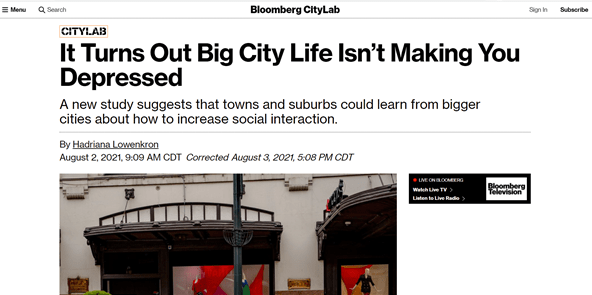MEDIA & NEWS
How a City is Organized can Create Less-Biased Citizens
"The city you live in could be making you, your family, and your friends more unconsciously racist. Or, your city might make you less racist. It depends on how populous, diverse, and segregated your city is, according to a new study that brings together the math of...

TVO Today: “Does Neuroscience Prove We Need Urban Green Spaces?”
"It's certainly more beautiful to be surrounded by mature trees than endless concrete and traffic. But research now also shows it could well be better for both your mental and physical health. Marc Berman, professor of psychology at the University of Chicago,...

UChicago News: “How do cities impact mental health? A new study finds lower rates of depression”
Large cities are often viewed as cold, fast-paced environments where crime rates are high and interpersonal interactions are fleeting—a combination that makes them detrimental to mental health. But new research provides evidence for the opposite: The socioeconomic networks and built environments of larger urban areas in the U.S. can actually predict lower rates of psychological depression.

Bloomberg CityLab: “It Turns Out Big City Life Isn’t Making You Depressed”
A new study suggests that towns and suburbs could learn from bigger cities about how to increase social interaction.
The study, to be published Aug. 3 in the Proceedings of the National Academy of Sciences journal, draws on mathematical models and multiple datasets to try to gauge how city size and the “built environment,’’ like structures and roads, influence depression…
